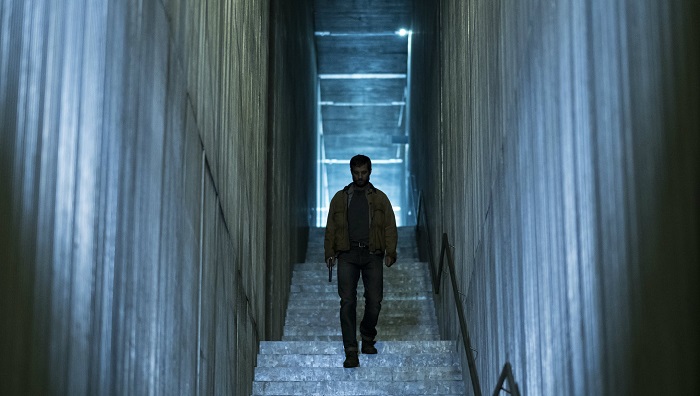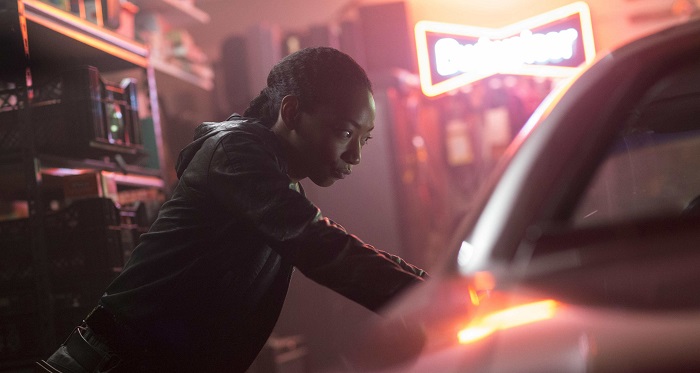Upgrade is the latest film from writer/director Leigh Whannell, formerly known as a horror writer on the Saw and Insidious franchises. His sci-fi thriller stars Logan Marshall-Green as Grey, a man who is paralyzed in an accident and watches his wife get murdered. Grey undergoes experimental surgery to repair his body that also introduces him to STEM, an AI that can speak to him and control his body to perform superhuman feats of strength, as he hunts down the men responsible for his wife’s death.
I had low expectations for this one going in. A low-budget Blumhouse flick with a no-name cast and an ex-horror director didn’t exactly scream virtuoso writing. But what I did get was a mostly-pleasant surprise: a competent thriller with excellent action sequences and compelling philosophical themes, despite some shortcomings in the acting and writing departments.

As mentioned earlier, this film was shot on a micro-budget of around $3-5 million dollars. This is honestly shocking to me because the film looks great! Flashy set pieces, high-tech equipment, and dazzling action sequences could have fooled me into believing the budget was far greater than it actually was. Major credit goes to director Whannell here; he is well-versed in making films on shoestring budgets, and he knows how to squeeze the most value out of every dollar spent. CGI is few and far between, but when it does pop up it doesn’t overload the senses, just enhances a scene that is already beautifully-shot. Practical effects are the key here, and Whannell (and certainly his DP and cinematographer) gets creative with the camera in order to maximize their impact.
The fight sequences were a lot of fun. Whannell plays with a unique shooting style in which Grey’s movements are stabilized and the camera moves with him. Every duck and dodge is matched by a camera tilt or pan, making for a visceral, cerebral experience that puts us in Grey’s shoes. The physical blocking of Grey’s movements compelements this style well; he uses deliberate, stilted movements that highlight his robotic nature. There was some surprising comedy in the early fight scenes as well, as Grey first allows STEM to take over and watches in horror/amazement at the things he is able to do. I kinda wish the film had leaned into that more instead of trying to get deeply philosophical at the end (which we’ll get into in a bit, I promise) because that’s where the bulk of this film’s merit lies.

Of course, with such a small budget you have to cut corners somewhere, and unfortunately here that’s the acting. I’ve never seen Logan Marshall-Green in a film before, but I’m sorry, I didn’t enjoy his performance at all. He had his moments for sure, like the aforementioned comedic sequences, but his dialogue was dry and wooden and he just seemed detached at all times. Similarly, Harrison Gilbertson as Eron wasn’t very believable either, which is a shame because his character was by far the most interesting. The only actor I recognized was Betty Gabriel (of Get Out fame), as a private detective trying to figure out what Grey’s deal is. I thought she was incredible in Get Out and did a competent job here, but her character was the weakest of the bunch, with no discernable character traits or motivations other than being uncommonly clever. I nearly checked out due to the poor acting overall, and wonder what could have been if they managed to find actors with more dramatic chops. But hey, it’s a low-budget mindless action flick, so they made that choice, I get it.
I want to spend some time talking about the very end of the film (spoiler warning, obviously). Our story ends as STEM fully takes over Grey’s body, creating an alternate reality for his host to live in while he takes full control for himself. Only here do we realize that STEM was the antagonist all along; all this conflict with Eron was merely a ruse in order for STEM to trick Grey into killing the creator of the project so the AI can roam free. It took me some time to process this ending, because my gut instinct was that it didn’t work and that it flew in the face of prior character development. And after some thought, I realized that it is the result of poor character development and inconsistent themes.
It’s amusing to me that I’m bothered by the non-traditional, “risky” ending when normally I praise films for taking risks like this and going against audience expectation. The problem is that the twist ending highlights an inherent problem with the script and the characters, namely our protagonist, Grey. It was only thanks to the ending that I realized why I disliked Grey as a character so much, and it’s because he has no choices to make. Things happen to him, and he rarely responds of his own accord. He undergoes the STEM surgery because he is paralyzed and has no other options. He lets STEM take over during fights because he will be killed otherwise. He obeys STEM’s wishes at the risk of losing function of his body again. And at the very end, we learn the extent of STEM’s meddling: the AI was in control the whole time, only presenting Grey with the illusion of choice.

Could we simply look at this and say that was the intent of the writer all along? I’m not so sure. Grey is presented early on as a skeptic, one who doesn’t trust technology and its “evil” influence. As we follow him through this dystopic future, he commonly reacts with disdain towards people who let technology take over their lives. For instance, when he visits a computer hacker and finds a room full of people playing with VR headsets, he laments that they have abandoned the real world for a false reality. So it doesn’t make sense to me that Grey would find happiness in the false reality that STEM creates for him, one in which he and his wife both survive the crash and live happily ever after.
The film even offers a pseudo-climax in which Grey shoots himself in the neck to remove STEM’s influence, Fight Club-style. That was similar to the ending I was expecting throughout: Grey finally realizes STEM’s evil nature and fights back to reclaim his independence. So is the message supposed to be more allegorical in nature, a Black Mirror-esque ending in which the computer wins? Is the takeaway that AI is far superior to mankind and it’s inevitable that they find a way to overpower us? If that’s the case, it’s a strange choice to first create an independent-skeptic protagonist and then generate a plot that sees him making no meaningful decisions. Furthermore, it negates any character arcs that have been set up and renders everything before it useless. It left a bad taste in my mouth and I’m still not sure if I liked the direction that the ending went.
Conclusion
Ultimately I had fun with Upgrade and would recommend it if you’re into action-thrillers. As a philosophical sci-fi film it has problems, however, as a result of strange character choices and shoddy plot development. But if you’re willing to not dig too deep into the overarching themes of the film and just roll with the punches like Grey does, you will have a good time.
VERDICT: C+
-AD
All image rights belong to Blumhouse Productions.
